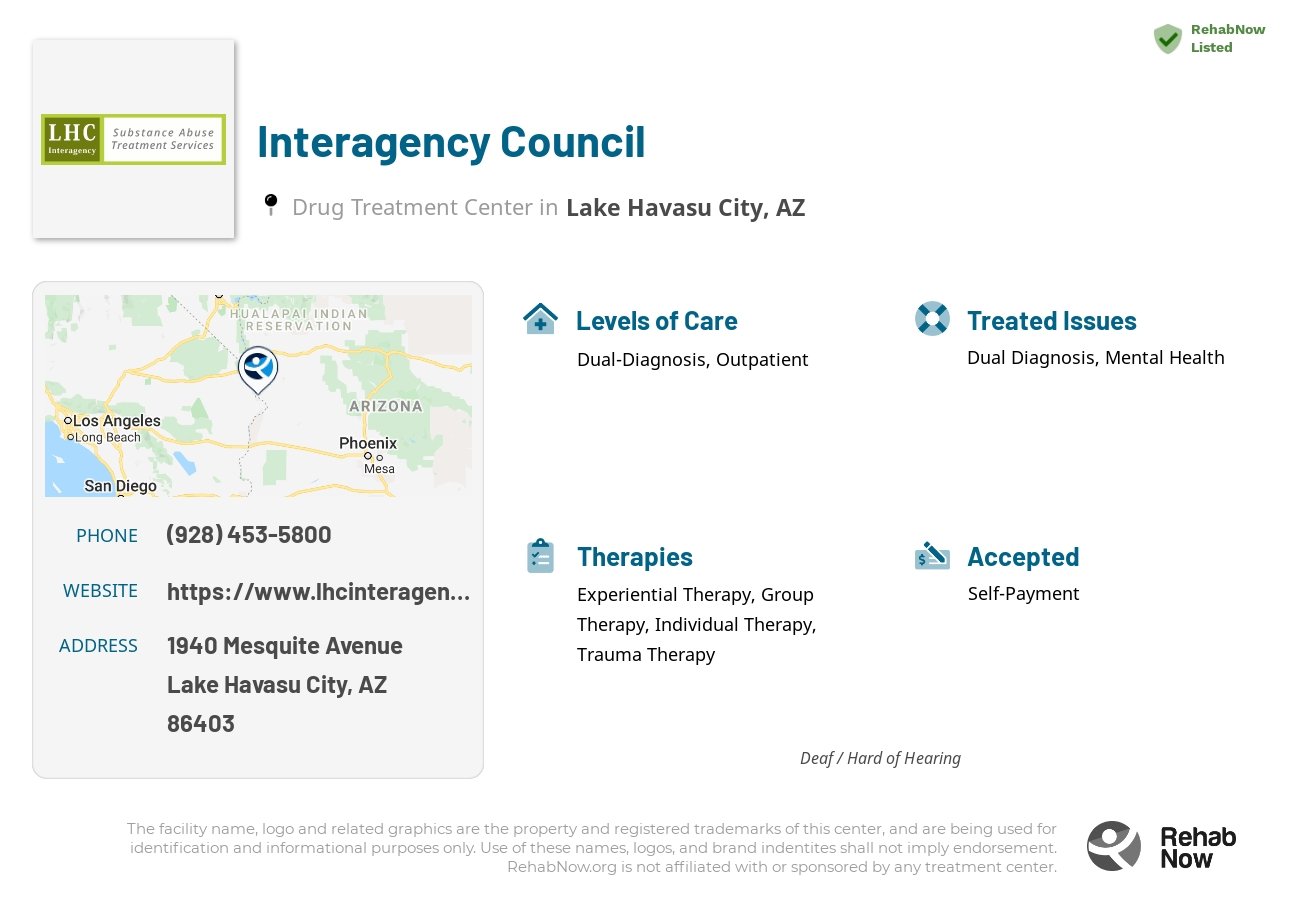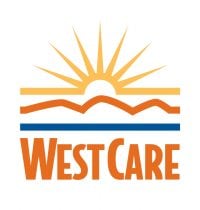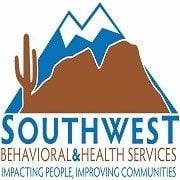Interagency Council
Drug Rehab Center in Lake Havasu City, Arizona
- Mental Health
- Dual Diagnosis
The Interagency Council in Lake Havasu City, AZ offers comprehensive services, including individualized and group therapies, trauma-informed therapy, and cognitive behavioral therapy, to help individuals dealing with mental health and dual-diagnosis issues achieve recovery and a better quality of life.
Multiple patients have reported Interagency Council as permanently closed.
Research other rehabs in Lake Havasu City, Arizona, or get help finding an open facility.
Our experts will find you an alternative facility.
(888) 674-0062 24/7 Free, Confidential, Expert HotlineAbout Interagency Council in Arizona
The Interagency Council in Lake Havasu City, AZ provides comprehensive services for those dealing with both mental health and dual-diagnosis issues. The Council offers an array of individualized and group therapies tailored to the unique needs of each client. Experiential, group and individual therapies are available to help those in need to identify, understand and address their issues. Trauma-informed therapy helps to address underlying causes of addiction while cognitive behavioral therapy (CBT) helps clients modify their thought and behavior patterns, setting them up for lasting sobriety. Long-term residential treatment and outpatient treatment options give clients the flexibility to pursue their recovery journey in whatever setting best suits their needs. The Interagency Council is dedicated to providing quality care for individuals suffering from mental health and dual-diagnosis issues in the Lake Havasu City area.
The Interagency Council makes a priority of providing client-centered care with a focus on treating the individual as a whole. This means that the team of professionals work together to address the client’s mental health, dual-diagnosis, and recovery needs in concert. All of the treatment options are designed to be empowering rather than punitive, and the goal of treatment is to give the client the skills needed to move forward in their recovery. The Council also provides resources for continued self-care and education for both clients and their families. Ultimately, the goal is to help individuals to achieve recovery and a better quality of life.
Genders
Ages
Modality
Additional
Conditions and Issues Treated
Dual-Diagnosis
Dual diagnosis refers to someone who has both an addiction and a mental or emotional illness. Dual diagnosis treatment includes therapy for both issues simultaneously, allowing for effective treatment of either.
Sometimes people with addiction disorders also have co-occurring disorders like depression, anxiety, bipolar disorder, etc. These require specialized treatment programs that address both drug and alcohol addiction as well as psychiatric illnesses. Some rehabilitation facilities provide patients with co-occurring disorders a program with highly integrated services and a clean, distraction-free environment.
Dual Diagnosis (Co-Occuring Disorders), Mental Health
Levels of Care Offered
This center offers a variety of custom treatment tailored to individual recovery. Currently available are Dual-Diagnosis, Outpatient, with additional therapies available as listed below.
Outpatient Program
Alcohol or drug addiction, or co-occurring disorders, are treated in an outpatient program. The patient must attend therapy and other programs at the facility but can return home each night.
Outpatient treatment allows recovering addicts to live at home while receiving addiction treatment. Outpatients can attend group sessions for a few hours per week. Outpatients may also continue to work full time and study/attend school without interruption if they choose.
Therapies & Programs
Individual Therapy
Different people react differently to various treatment options. Some drug rehabilitation centers offer individualized treatment that caters to the specific needs of a drug addict. The best treatment option varies on an individual depending on the type of drug abused, life history, medical condition of the person, social circumstances, and the environment they live in now.
When a person enters drug rehab, they usually have anti-drug associations such as withdrawal symptoms, stress, cravings, etc. The first step of drug rehab is to detoxify the body from any residual substances in it. Drug rehabilitation centers usually employ trained medical professionals to help in this process. Usually, the initial detoxification lasts for five days, where the person is monitored under close supervision.
Attending group therapy at Interagency Council in , is a useful way for those seeking sobriety to realize they aren’t the only one going through it.
This is when a group of people on different recovery phases get together and talk about what they’re going through, their triggers, successes, and failures. This can include alternative types of therapies too! Group therapy may occur on an outpatient or inpatient basis with groups that have no pre-existing relationships outside the session, unlike support groups where everyone already knows each other beforehand.
Trauma therapy is a form of therapy used to help people process and understand past traumas. This can help struggling addicts, as many people turn to drugs or alcohol to mask the pain of their past. Trauma therapy can be done in several ways, such as through visualization, discussion, and writing down thoughts and feelings. The goal is to help the individual understand why they are having problems coping with certain situations and changing how they think and react to things. This is often done in tandem with other therapies to treat the underlying issues associated with addiction.
The idea behind trauma therapy is that while some people can experience traumatic events and not have lasting psychiatric symptoms, many others will. In these cases, memories get hidden from consciousness but continue to influence how the person processes and copes with things in their life. They may avoid situations that resemble what happened or become suddenly angry or irritated to a situation that reminds them of a past event. With the help of a therapist, people can go back over memories and experiences. This helps them understand why they are having problems coping with certain situations and changing how they think and react to things.
The use of Rational Emotional Behavior Therapy for addicts has been shown to have positive and desirable outcomes. It is a form of specific counseling that replaces negative and self-limiting thoughts with positive and productive behaviors. Self-defeating thoughts and habits can limit your possible successes. Some examples of this are procrastination, unhealthy eating, and angry outbursts. You may not be aware that some unhealthy behaviors and thoughts are sabotaging your potential accomplishments.
Cognitive Behavioral Treatment (CBT), Dual-Diagnosis, Experiential Therapy, Group Therapy, Individual Therapy, Outpatient Treatment (OP), Residential Long Term (>30 Days), Trauma Therapy
Patient Experience
Experiential Therapy at Interagency Council
Experiential therapy is a type of therapeutic approach that focuses on having patients work through problems, issues, or emotions by engaging directly in some real experience. It occurs face-to-face with a therapist who helps these people to explore their feelings first hand. The hope is that when this happens, the patient will feel driven to turn away from their destructive behavior and instead take up positive behaviors or coping mechanisms. Direct experience methods, role play, psychodrama, interpersonal and social learning are a few different forms of experiential therapy.
Payment Options Accepted
For specific insurance or payment methods please contact us.
Additional Details
Specifics, location, and helpful extra information.
Lake Havasu City, Arizona 86403 Phone Number(928) 453-5800 Meta DetailsUpdated November 25, 2023
Staff Verified
Interagency Council Patient Reviews
There are no reviews yet. Be the first one to write one.
Lake Havasu City, Arizona Addiction Information
Arizona has some of the highest rates of prescription drug abuse in the United States. Methamphetamines, heroin and morphine are among the most commonly abused substances. Prescription pain relievers were prescribed to 348 million people in 2012, enough to medicate every adult in Arizona for 2 full weeks. The number of people with substance use disorders in Arizona has remained relatively constant over the past few years.
Lake Havasu City, Arizona, has a worse drug addiction problem. The city has a rate of 11.8 drug-related deaths per 100,000 people. 1 in 5 high school seniors reported past-year use of an illicit drug, and 8.4 percent of eighth-graders reported using an illicit drug in the past year. The treatment process in Lake Havasu City depends on the program and facility chosen. However, most rehab programs will begin with a detoxification.
Treatment in Nearby Cities
- Polacca, AZ (242.5 mi.)
- Littlefield, AZ (168.2 mi.)
- Lake Havasu City, AZ (0.8 mi.)
- Oracle, AZ (242.6 mi.)
- Fountain Hills, AZ (161.3 mi.)
Centers near Interagency Council
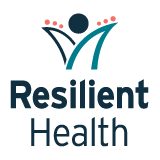

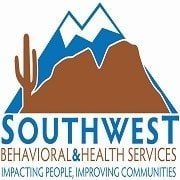
The facility name, logo and brand are the property and registered trademarks of Interagency Council, and are being used for identification and informational purposes only. Use of these names, logos and brands shall not imply endorsement. RehabNow.org is not affiliated with or sponsored by Interagency Council.


